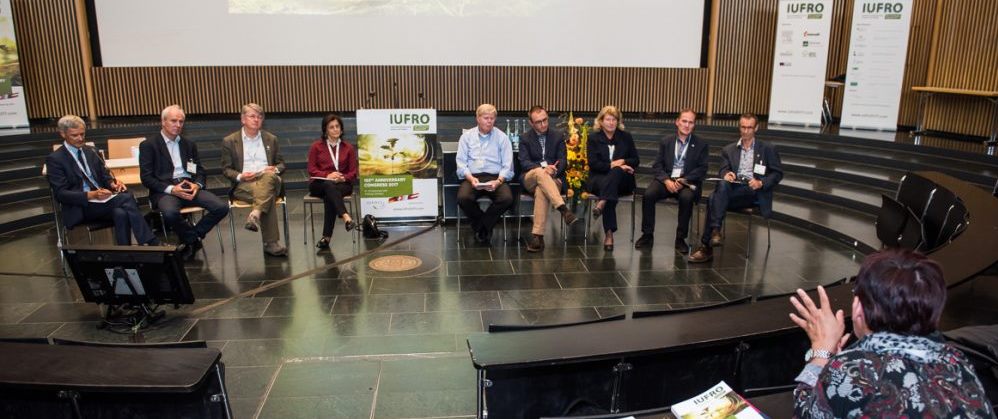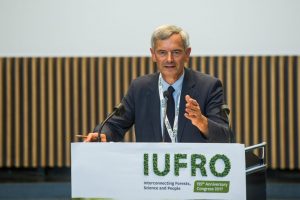IUFRO All-Division 4 Meeting at the 125th Anniversary Congress
An Interview with Division 4 Coordinator Jean-Luc Peyron of the Public Interest Group (GIP) on Forest Ecosystems (ECOFOR), France
————
The International Union of Forest Research Organizations (IUFRO) is a non-profit, non-governmental international network of forest scientists, which promotes global cooperation in forest-related research and enhances the understanding of the ecological, economic and social aspects of forests and trees. IUFRO’s 125th Anniversary Congress was held in Freiburg, Germany, 18-22 September 2017.
IUFRO is “the” global network for forest science cooperation. It unites more than 15,000 scientists in almost 700 Member Organizations in over 120 countries, and is a member of the International Council for Science (ICSU). Scientists cooperate in IUFRO on a voluntary basis.
IUFRO’s field of scientific activity is spread over nine Divisions covering key forest research fields: Silviculture; Physiology and Genetics; Forest Operations, Engineering and Management; Forest Assessment, Modelling and Management; Forest Products; Social Aspects of Forests and Forestry; Forest Health; and Forest Policy and Economics.
Each of those Divisions is broken into units that focus on specific aspects that fall under the divisional umbrella.
Five of the nine Divisions held all-Division meetings in conjunction with the IUFRO 125th Anniversary Congress. At the all-Division meetings, researchers were brought up to date, through a number of presentations, on issues and findings pertinent to them.

Division 4 Forest Assessment, Modelling and Management includes: studies of growth and yield (including mensuration); forest resource inventory (collection and analysis of resource data); forest management planning and managerial economics; remote sensing; management sciences of forest enterprises; statistical methods, mathematics and computer technology.
The units within Division 4 look into forest mensuration and modeling; forest resources inventory and monitoring; informatics, modeling and statistics; forest management planning and managerial economics and accounting.
————–
Dr. Jean-Luc Peyron of the Public Interest Group (GIP) on Forest Ecosystems (ECOFOR) and the Coordinator of IUFRO Division 4 elaborated on his Division’s work:
“The research range of our Division is rather broad, but it is consistent with the needs of policy makers and forest practitioners,” Dr. Peyron said. “Therefore, it is transdisciplinary as well as interdisciplinary. And, for IUFRO, it means that Division 4 is linked to all five strategic themes and all eight other divisions.”

Jean-Luc Peyron, Coordinator of IUFRO Division 4 – Forest Assessment, Modelling and Management
“While all our activities are necessary and productive, technological developments give great opportunities to forest assessment, information systems, and the constitution and use of big data sets. All activities expand their scope from timber production to a large set of ecosystem services.
“All of them are also concerned by changes, risks and uncertainty that have to be reduced, as long as it is possible, but also “managed” – that means taken into account in the decisional process,” he said.
Elaborating on the uncertainty issue, he said: “Forest assessment measurements are made in order to predict the value of some variables and models are run to predict the evolution of those variables. There are uncertainties behind those results, especially when the prediction horizon is long,” he said.
“But in the decision-making process, other kinds of uncertainties – or even unknowns – are encountered. When they depend on future human behavior, they can’t be reduced much and that has to be taken into account and communicated in some way.
“So, what we have to do is produce models that integrate several scenarios and also take into account several management options. And that has to be communicated transparently to decision makers,” he said.
On another issue, he noted that “context can change very rapidly and there is a bit of lag-time before research catches up. So the challenge is to increase research reaction time and to shrink the gap between research findings and policy implementation.
“Considered globally, IUFRO is very active in these two areas: as a network of scientific organizations, IUFRO stimulates exchanges be-tween researchers all around the world; as a science-policy interface, IUFRO increases the communication channels between theory and practice,” Dr. Peyron said.
For the Freiburg Congress, his Division organized more than 20 sessions – most of them on themes identified by the different units within the Division.
“But,” he said, “there was also an open session for papers that fit well with the Division scope but not so well with the subjects of the other sessions. And, the Division also organized a sub-plenary session on ‘innovative assessment and sustainable forest management in a changing world’.”
One of the advantages of the 125th Anniversary Congress, he said, was that it brought together many different people from many different disciplines and provided an excellent opportunity to exchange ideas about complex issues.
As an example, he noted, “the contribution of the forest-based sector to climate regulation is a particular subject of discussion.
“This issue concerns several functional processes of forest ecosystems and of the atmosphere, at the level of carbon, water and energy cycles. It also concerns choices that are made by society at large – trade-offs between land-uses, materials or energies.
“Many disciplines are necessary to deal with all the facets of this issue and, thus, it is analyzed from very different points of view. Sometimes, understanding other points of view that involve different concepts and methods can become a challenge,” he said. “A Congress such as this one allows us to hear, consider and discuss those different perspectives.”
Looking ahead, in regard to his Division’s activities, he said: “Some primary issues are the big data challenge, integrated forest management in scope, time, and spatial scale, climate change considered both from adaptation and mitigation points of view.” And then he added: “Among others.”
Visit the IUFRO Anniversary Congress website for an overview of the program and for photos. Videos of the live-streamed sessions will be available on: http://iufro2017.com/

Leave a Reply